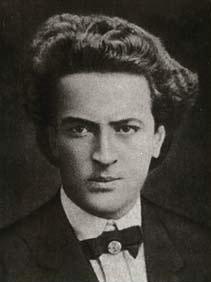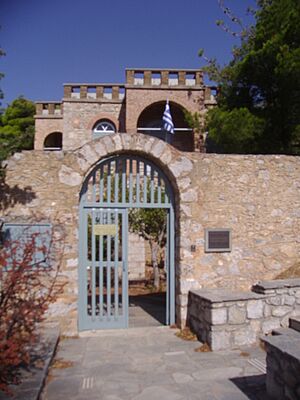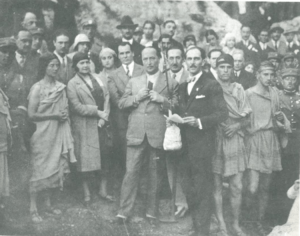Angelos Sikelianos facts for kids
Quick facts for kids
Angelos Sikelianos
|
|
|---|---|
 |
|
| Born | 28 March 1884 Lefkada, Greece |
| Died | 19 June 1951 (aged 67) Athens, Greece |
| Occupation | Poet |
| Spouse |
Anna Karamani
(m. 1940) |
| Children | 1 |
| Signature | |
 |
|
Angelos Sikelianos (born March 28, 1884 – died June 19, 1951) was a famous Greek poet and writer. He wrote many poems and plays. His works often explored Greek history and religious ideas. He also wrote about the idea of people living together in harmony.
Some of his well-known poems include The Moonstruck and Prologue to Life. His plays include Sibylla and The Death of Digenis. Sikelianos was nominated for the Nobel Prize for Literature every year from 1946 to 1951.
Contents
Life Story of Angelos Sikelianos
Angelos Sikelianos was born on the island of Lefkada in Greece. He spent his childhood there. In 1900, he started studying law in Athens. However, he never finished his degree.
Over the next few years, he traveled a lot. He spent his time writing poetry. In 1907, he married an American woman named Eva Palmer in the United States. They moved to Athens in 1908. During this time, Sikelianos met many smart Greek thinkers. In 1909, he published his first book of poems, Alafroískïotos (The Moonstruck). It quickly became very popular.
Sikelianos also became good friends with another writer, Nikos Kazantzakis. In 1914, they spent 40 days on Mount Athos. They visited many monasteries there. They lived a simple life, like monks. The next year, they went on a trip through Greece. Both writers wanted to help people improve their minds and spirits through art.
The Delphic Festivals
In May 1927, Sikelianos and his wife, Eva Palmer-Sikelianos, started the Delphic Festival. This was part of his plan to bring back the "Delphic Idea." Sikelianos believed that the ideas from classical times could help people find spiritual freedom. He thought these ideas could also help people communicate better.
The festival included sports contests, like the ancient Pythian Games. There was also a concert of Byzantine music. People could see an exhibition of folk art. A play called Prometheus Bound was also performed.
Many critics praised the Delphic Festivals. Even though the government did not help much, they held the festival again three years later. But it cost too much money to organize. So, the festivals stopped. To honor Angelos and Eva Sikelianos, the European Cultural Centre of Delphi bought their house in Delphi. It is now a museum about the Delphic Festivals. Later, Eva Palmer-Sikelianos moved to the United States. Sikelianos then married Anna Karamani.
Later Life and Impact
During the Axis occupation of Greece (1941–1944), Sikelianos inspired the Greek people. He gave a powerful speech and read a poem at the funeral of poet Kostis Palamas. He also helped write an important letter. This letter was led by Archbishop Damaskinos. It asked the Germans to save the lives of Greek Jews. Many important Greek citizens signed this letter. It was a brave act of protest against the Nazi occupiers. No other European country has a similar document from that time.
In 1945, he helped start the Greek-Soviet friendship union. Other famous people like Nikos Kazantzakis were also part of it.
Angelos Sikelianos had a long-term illness. He died accidentally on June 19, 1951, in Athens. He mistakenly drank the wrong liquid. He was buried in the First Cemetery of Athens. His great-granddaughter, Eleni Sikelianos, is also a poet.
His Works
Sikelianos published his poetry in three books in 1946 and 1947. He called this collection "Lyric Life." He also left many poems unpublished. In 1965, a Greek scholar named G.P. Savvides began publishing all of Sikelianos's poems. This complete collection ended up being five books long.
Translations
- Selected Poems, translated by E. Keeley, P. Sherrard (1979; reprinted 1980) ISBN: 960-7120-12-4
See also
 In Spanish: Ángelos Sikelianós para niños
In Spanish: Ángelos Sikelianós para niños
 | Bessie Coleman |
 | Spann Watson |
 | Jill E. Brown |
 | Sherman W. White |



